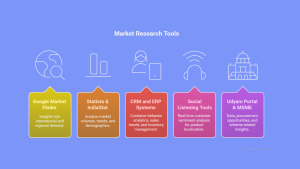Market Expansion Analysis for MSMEs: Tools, Approaches & Emerging Trends
For MSMEs aiming to grow beyond their current markets, expansion requires more than ambition—it demands structured analysis and strategic planning. Whether targeting new geographic regions, launching additional product lines, or entering international markets, businesses must assess feasibility, competition, customer demand, and regulatory conditions.
Market expansion analysis enables MSME leaders to make informed decisions by identifying where opportunities exist and what resources are required to capture them. This article outlines the primary analytical approaches, widely used tools, and current trends shaping market expansion efforts among MSMEs today.
Understanding Market Expansion Analysis
At its core, market expansion analysis is the strategic evaluation of opportunities to grow a business by entering new markets—be it geographical, demographic, or product-based. For MSMEs, it often means scaling from local to regional, national, or even international markets.
The analysis typically involves:
- Identifying Market Gaps: Where is the unmet demand?
- Assessing Customer Segments: Who are the potential buyers? Are their needs aligned with your offerings?
- Studying Competitive Dynamics: What are others doing, and what’s your edge?
- Evaluating Distribution Channels: How will you deliver your product or service efficiently?
- Regulatory Landscape: Are there entry barriers, taxation differences, or compliance requirements?
Major Approaches to Market Expansion Analysis
- SWOT and PESTLE Analysis
These foundational tools remain highly relevant. SWOT (Strengths, Weaknesses, Opportunities, Threats) helps assess internal and external dynamics, while PESTLE (Political, Economic, Social, Technological, Legal, Environmental) enables a macro-level market study—especially crucial when moving into new states or exporting abroad.
- Porter’s Five Forces
This model helps MSMEs analyze the competitive intensity and profitability of a market. It guides them in understanding the bargaining power of buyers and suppliers, threat of substitutes, and competitive rivalry—useful for sectors like manufacturing, textiles, and pharmaceuticals.
- Market Segmentation & Customer Profiling
Deep-diving into psychographics, geographics, and behavioral attributes of customers enables MSMEs to tailor their offerings. For instance, rural vs. urban market dynamics can be strikingly different even within the same state.
- Data-Driven Demand Forecasting
Using historical sales data, seasonal trends, and external economic indicators, MSMEs can predict demand and plan accordingly. This is critical for industries like FMCG, agri-processing, and consumer durables.
Popular Tools for Market Expansion Analysis
While traditional models remain useful, several digital tools now provide real-time insights and data for faster, more informed decisions:
- Google Market Finder & Trends: Offers insights into international and regional demand.
- Statista & IndiaStat: Statistical databases that help analyze market volumes, trends, and demographics.
- CRM and ERP Systems (Zoho, TallyPrime, Marg ERP): Provide customer behavior analytics, sales trends, and inventory management.
- Social Listening Tools (Hootsuite, Sprout Social): Offer real-time customer sentiment analysis—useful for product localization.
- Udyam Portal & MSME SAMBANDH: Government-backed platforms that provide data, procurement opportunities, and scheme-related insights.

Latest Trends in Market Expansion Among MSMEs
- Digital-First Expansion
Post-COVID, a significant number of MSMEs are adopting e-commerce and digital marketplaces like ONDC, Amazon India, and Flipkart to expand without investing in brick-and-mortar stores.
- Tier 2 & 3 Market Penetration
With metro markets saturating, high-growth potential is emerging from smaller cities and towns. MSMEs in education tech, consumer goods, and fintech are actively targeting these underserved regions.
- Export Diversification with Government Support
Schemes like Champion Services Sector Scheme and Market Access Initiative are nudging MSMEs to explore exports beyond traditional markets like the US and EU, into Africa, Southeast Asia, and the Middle East.
- Green Products and ESG-driven Growth
Environmentally responsible manufacturing and ESG reporting are gaining traction, especially for MSMEs looking to partner with global brands or apply for green financing.
- Cluster-Based Development
MSME clusters in Gujarat, Tamil Nadu, and Maharashtra are being supported for market linkages through Common Facility Centres (CFCs) and Export Promotion Councils, enabling collective branding and supply chain efficiencies.
Actionable Steps for MSMEs Considering Market Expansion
- Begin with a Localized SWOT Analysis—start small and build from your current strengths while understanding local nuances.
- Leverage Government Data & Schemes—explore opportunities listed on the Udyam Portal, DGFT dashboard, and MSME Champions platform.
- Invest in Market Intelligence Tools—integrate simple analytics tools into your CRM or ERP systems to track sales and customer patterns.
- Pilot-Test in Target Markets—run small-scale marketing campaigns or product trials before a full-scale rollout.
- Seek Strategic Partnerships—identify local distributors, franchisees, or digital marketplaces to minimize upfront risks.
- Build Digital Competence—a website, e-commerce readiness, and digital marketing are no longer optional.
- Track KPIs Post-Entry—measure customer acquisition cost, retention, feedback, and region-wise profitability to refine strategy.
Market expansion for MSMEs is both an opportunity and a challenge. With the right tools, thoughtful analysis, and awareness of current trends, it becomes a manageable and profitable transition. Whether you’re targeting regional growth or exploring international markets, strategic preparation makes all the difference.
MSME Strategy Consultants (msmestrategy.com) offers tailored market expansion strategies—experienced consultants are ready to help you turn insights into action.
#MSMEStrategy #MarketExpansion #MSMEIndia #SmallBusinessGrowth #DigitalIndia #MakeInIndia #ExportFromIndia #Tier2Markets #MSMEConsulting





